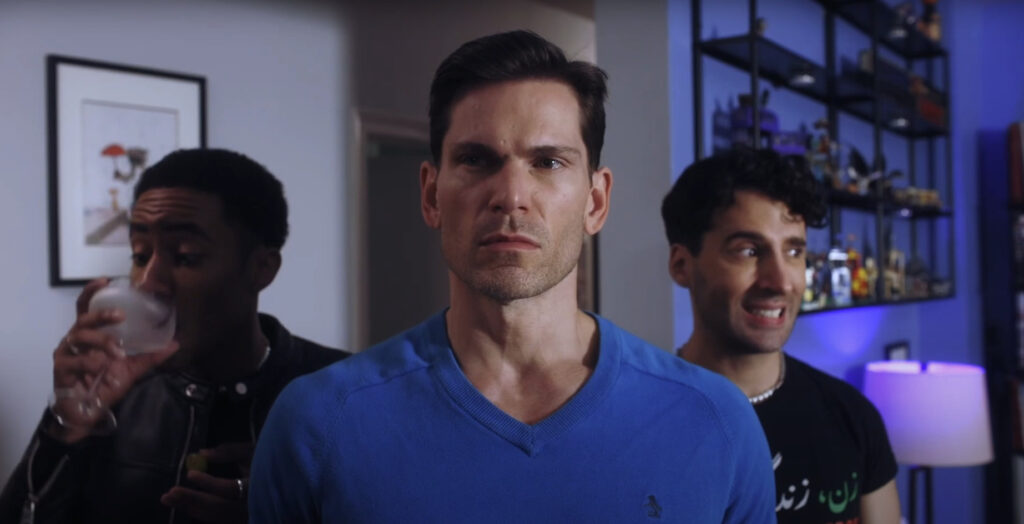Imagine sitting down to dinner: you start off with a Jell-O shot made of really cheap vodka. You pop that bad boy quickly. Then, you get a glass of Burgundy wine—you want to savor every sip and embrace the complex flavors and mouth feel of the vino.
The experience I described above best summarizes how one will feel while watching Paul Rudnick’s absolutely absurd play The New Century, which, for the most part, is unquestionably self-aware of just how campy and ridiculous it is. However, right along with the camp is a heartfelt pulse of what it means to be human, what it means to be gay, and how these elements collide. Nevertheless, you can’t go into the theater taking yourself too seriously because, after all, you’re about to indulge in some of those Jell-O shots mentioned above.
The play is essentially a series of monologues, featuring three outlandish characters, who all “magically” come together at the end in a New York City hospital newborn ward, followed by a late-night gay Floridian television dance-party show (don’t ask and don’t think too hard, okay?). The main players involved could best be described by one of the lines in the play: its like “if Pottery Barn sold people.” They include a Long Island Jewish mother, a flamboyant television host who was kicked out of New York because he was “too gay” (thus the name of his show), his hunky, yet painfully dim assistant, and a mid-western female crafter. Have I lost you yet?
Elaine Fydrych plays the Jewish matriarch, Helene, to great humorous appeal. Helene attempts to be a “gay supermom,” so to speak, after she discovers that her one daughter is a lesbian (she tells her daughter, “Even Helen Keller would know you are a lesbian”), her one son is transgender (she gives her “daughter” a Visa to have her hormone replacements), and her youngest son is a staunch gay leatherman who enjoys playing with his own feces. What’s most interesting about Ms. Fydrych’s portrayal is that she clearly shows the audience that underneath the so-called “accepting” mother, there is a true sense of discomfort over her gay family—Helene overcompensates to hide this discomposure.
R. Eric Thomas plays Mr. Charles, the over-the-top flamboyant late-night gay television host forced to flee New York City over his “gayness.” Mr. Rudnick could have done much more to develop the character of Mr. Charles; however, Mr. Thomas quite literally throws his entire body and soul into the depiction of the character, including donning an absolutely ridiculous costume, complete with pink crocodile driving loafers. We find that Mr. Charles ultimately feels threatened with modern gay men, a combination of both self-loathing and bullying as a child. The most powerful moment for the character is when he recalls looking at himself in the mirror and deciding to don his façade in order to save face, and Mr. Thomas delivers this memory with heartfelt honesty.
The performance of the evening goes to Peggy Smith who plays crafter Barbara Ellen. Ms. Smith’s depiction of this obsessive-compulsive woman covered with glitter, glue, and tape is nothing short of astonishing, and she was met with thunderous applause at the end of her monologue. We find that Barbara Ellen’s gay son died of AIDS; in her portrayal of the character, Ms. Smith clearly shows the conflicted anguish she has over her son’s life, a feeling of abandonment after he moved to New York City to become a “fancy costume designer.” Mr. Rudnick’s dramatization of Barbara Ellen is the strongest in the play, and we wish we could stay with this character throughout (here’s the glass of wine I earlier referenced). The character makes a square for the AIDS Quilt, a project she describes as “a cemetery created by Ladies Home Journal.”
Yes, there is a total lack of confluence between these three characters: the closest connection the three have is when Shane, the dim-witted assistant of Mr. Charles, played rather humorously by Will Connell, has an “A-Ha!” moment that deals with the off-price discount store Century 21 (“It’s like if Patti LuPone was a store,” he says). As all of the characters get verklempt over markdown Ralph Lauren, you start to wish that the world, too, could come to peace over a deal at TJ Maxx or some cheap Tory Burch sandals at Nordstrom Rack. But, this, of course, would be as unrealistic as the world created by the play.
The New Century plays Second Stage at the Adrienne, 2030 Sansom Street, Philadelphia, through August 24, 2013. For more information, visit www.quinceproductions.com, or call 215-627-1088.
PHILADELPHIA PRIDE MARCH AND FESTIVAL
Join us for the Philly Pride 2024: Be You, featuring the largest rainbow flag and a vibrant festival. Discover community, celebration, and support!






